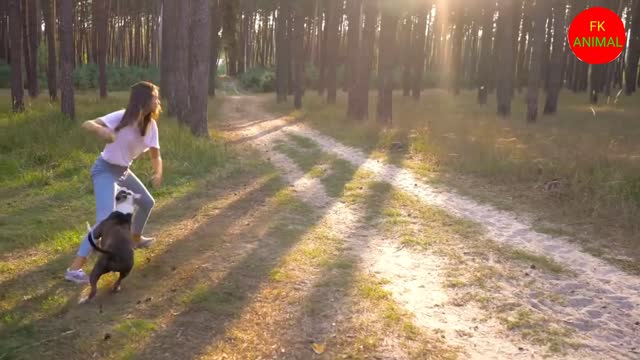Premium Only Content

Nice dog video new
Welcome my fk animal channel
Dog
Pet Animal
Dog, (Canis lupus familiaris), domestic mammal of the family Canidae (order Carnivora). It is a subspecies of the gray wolf (Canis lupus) and is related to foxes and jackals.
The dog is one of the two most ubiquitous and most popular domestic animals in the world (the cat is the other). For more than 12,000 years it has lived with humans as a hunting companion, protector, object of scorn or adoration, and friend.
Millenia of puppy love have generated more than 400 breeds of domestic dog (Canis lupus familiaris), ranging from the wolfish, robust Siberian husky to the shrieking, guinea-pig adjacent chihuahua.
Research on the origin of dogs, and on their unique, sympatric relationships with humans, is ongoing. Now if someone would only figure out why LOLCats have such an edge over similar canine memes...
Dogs (Canis lupus familiaris) are domesticated mammals, not natural wild animals. They were originally bred from wolves. They have been bred by humans for a long time, and were the first animals ever to be domesticated.
There are different studies that suggest that this happened between 15.000 and 100.000 years before our time. The dingo is also a dog, but many dingos have become wild animals again and live independently of humans in the range where they occur
They are sometimes called "canines" from the Latin word for dog - canis. Sometimes people also use "dog" to describe other canids, such as wolves. A baby dog is called a pup or puppy. A dog is called a puppy until it is about one year old.
Dogs are sometimes referred to as "man's best friend" because they are kept as domestic pets and are usually loyal and like being around humans. Dogs like to be petted, but only when they can first see the petter's hand before petting; one should never pet a dog from behind.
General characteristics
Anatomy
Domestic dogs have been selectively bred for millennia for various behaviors, sensory capabilities, and physical attributes.
Modern dog breeds show more variation in size, appearance, and behavior than any other domestic animal. Dogs are predators and scavengers; like many other predatory mammals, the dog has powerful muscles, fused wrist bones, a cardiovascular system that supports both sprinting and endurance, and teeth for catching and tearing.
Size and weight
Dogs are highly variable in height and weight. The smallest known adult dog was a Yorkshire Terrier, that stood only 6.3 cm (2.5 in) at the shoulder, 9.5 cm (3.7 in) in length along the head-and-body,
and weighed only 113 grams (4.0 oz). The largest known dog was a Saint Bernard which weighed 167.6 kg (369 lb) and was 250 cm (98 in) from the snout to the tail. The tallest dog is a Great Dane that stands 106.7 cm (42.0 in) at the shoulder.
Senses
The dog's senses include vision, hearing, sense of smell, sense of taste, touch and sensitivity to the earth's magnetic field. Another study suggested that dogs can see the earth's magnetic field.
Coat
The coats of domestic dogs are of two varieties: "double" being common with dogs (as well as wolves) originating from colder climates, made up of a coarse guard hair and a soft down hair, or "single", with the topcoat only. Breeds may have an occasional "blaze", stripe, or "star" of white fur on their chest or underside.
Regarding coat appearance or health, the coat can be maintained or affected by multiple nutrients present in the diet, see Coat (dog) for more information.
Premature graying can occur in dogs from as early as one year of age. This has been shown to be associated with impulsive behaviors, anxiety behaviors, fear of noise, and fear of unfamiliar people or animals.
Tail
There are many different shapes for dog tails: straight, straight up, sickle, curled, or cork-screw. As with many canids, one of the primary functions of a dog's tail is to communicate their emotional state,
which can be important in getting along with others. In some hunting dogs, however, the tail is traditionally docked to avoid injuries.In some breeds, such as the Braque du Bourbonnais, puppies can be born with a short tail or no tail at all.
Health
Some breeds of dogs are prone to certain genetic ailments such as elbow and hip dysplasia, blindness, deafness, pulmonic stenosis, cleft palate, and trick knees. Two serious medical conditions particularly affecting dogs are pyometra, affecting unspayed females of all types and ages,
and gastric dilatation volvulus (bloat), which affects the larger breeds or deep-chested dogs. Both of these are acute conditions, and can kill rapidly. Dogs are also susceptible to parasites such as fleas, ticks, mites, hookworms, tapeworms, roundworms, and heartworms (roundworm species that lives in the heart of dogs).
A number of common human foods and household ingestibles are toxic to dogs, including chocolate solids (theobromine poisoning), onion and garlic (thiosulphate, sulfoxide or disulfide poisoning), grapes and raisins, macadamia nuts, xylitol, as well as various plants and other potentially ingested materials.
The nicotine in tobacco can also be dangerous. Dogs can be exposed to the substance by scavenging through garbage bins or ashtrays and eating cigars and cigarettes. Signs can be vomiting of large amounts (e.g., from eating cigar butts) or diarrhea.
Some other signs are abdominal pain, loss of coordination, collapse, or death. Dogs are susceptible to theobromine poisoning, typically from ingestion of chocolate.
Theobromine is toxic to dogs because, although the dog's metabolism is capable of breaking down the chemical, the process is so slow that for some dogs even small amounts of chocolate can be fatal, especially dark chocolate.
Lifespan
In 2013, a study found that mixed breeds live on average 1.2 years longer than pure breeds, and that increasing body-weight was negatively correlated with longevity (i.e. the heavier the dog the shorter its lifespan).
The typical lifespan of dogs varies widely among breeds, but for most the median longevity, the age at which half the dogs in a population have died and half are still alive, ranges from 10 to 13 years. Individual dogs may live well beyond the median of their breed.
The breed with the shortest lifespan (among breeds for which there is a questionnaire survey with a reasonable sample size) is the Dogue de Bordeaux, with a median longevity of about 5.2 years, but several breeds, including miniature bull terriers, bloodhounds, and Irish wolfhounds are nearly as short-lived, with median longevities of 6 to 7 years.
Teeth
Dogs have two sets of teeth. Twenty-eight deciduous teeth erupt by six to eight weeks of age, and by the time puppies are six to seven months old these deciduous teeth are all replaced by 42 adult teeth.
The permanent teeth include incisors, which are used to nip and bite; canines, which tear and shred flesh; and premolars and molars, which shear and crush. In short, a dog’s teeth serve as weapons and as tools for cutting or tearing food.
The canines are the upper and lower fangs for which the dog family was named. As in most carnivores, the teeth are high-crowned and pointed, unlike the broad, grinding teeth of many herbivorous animals.
-
 2:34:48
2:34:48
Laura Loomer
9 hours agoEP112: MS-13 EVICTED By President Trump
57.1K33 -
 2:53:28
2:53:28
Toolman Tim
7 hours agoCommunity Gaming Night!! | Among Us
33K1 -
 2:34:47
2:34:47
GamerGril
7 hours agoMost Dangerous Gril This Side Of The Mississippi
23.7K3 -
 3:44:43
3:44:43
ZWOGs
7 hours ago🔴LIVE IN 1440p! - FiveM Fridays!! GTAV RP!! | Dwindle Digby | - Come Hang Out!
20.5K -
 2:05:43
2:05:43
TimcastIRL
9 hours agoTrump Admin Notifies Congress USAID Is CLOSED, Fires EVERYONE, ITS OVER w/Dan Holloway | Timcast IRL
218K156 -
 51:18
51:18
Man in America
13 hours agoClear Skies Coming? States Rally to Ban Geoengineering as RFK Jr. Calls Out ‘Toxic Dousing'
44.4K88 -
 2:22:55
2:22:55
BlackDiamondGunsandGear
14 hours agoThe time is NOW! / EDC / Preps / Load Out
19.1K -
 7:15:16
7:15:16
AirCondaTv Gaming
9 hours ago $0.69 earnedR.E.P.O. - Tonigth's Gonna Be a Good Night (Collab)
16.2K -
 2:03:06
2:03:06
Ninety7Bravo
8 hours ago🔴 LIVE | My First Look | Atomfall | 28 Mar 2025
18.5K -
 6:35:28
6:35:28
EnDuEnDo
12 hours agoGreaseMonkeyEddie On Duty In Fivem!!
20.9K1